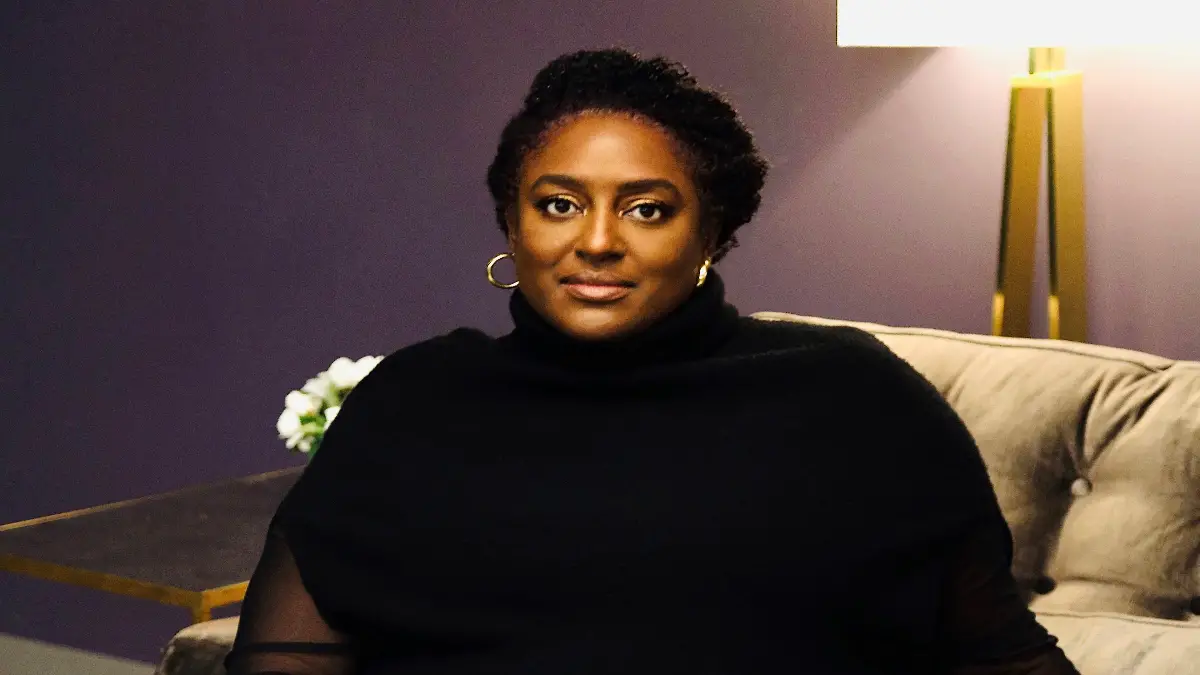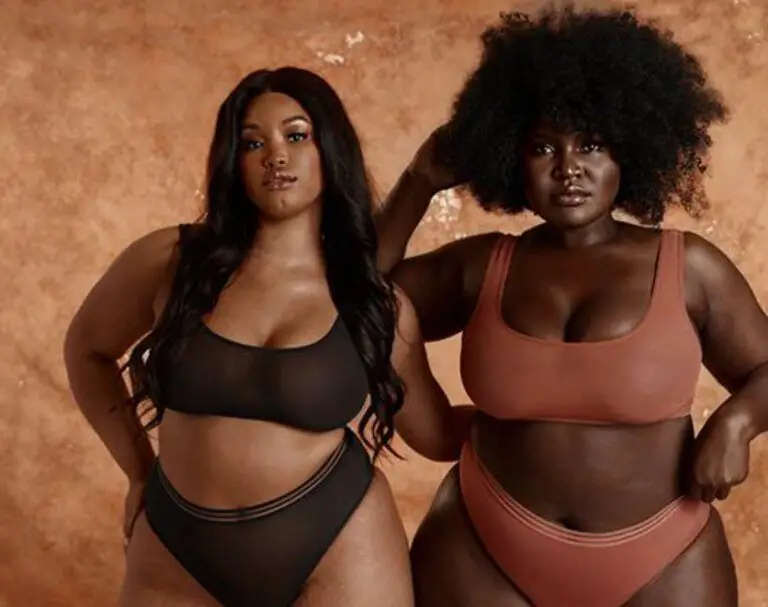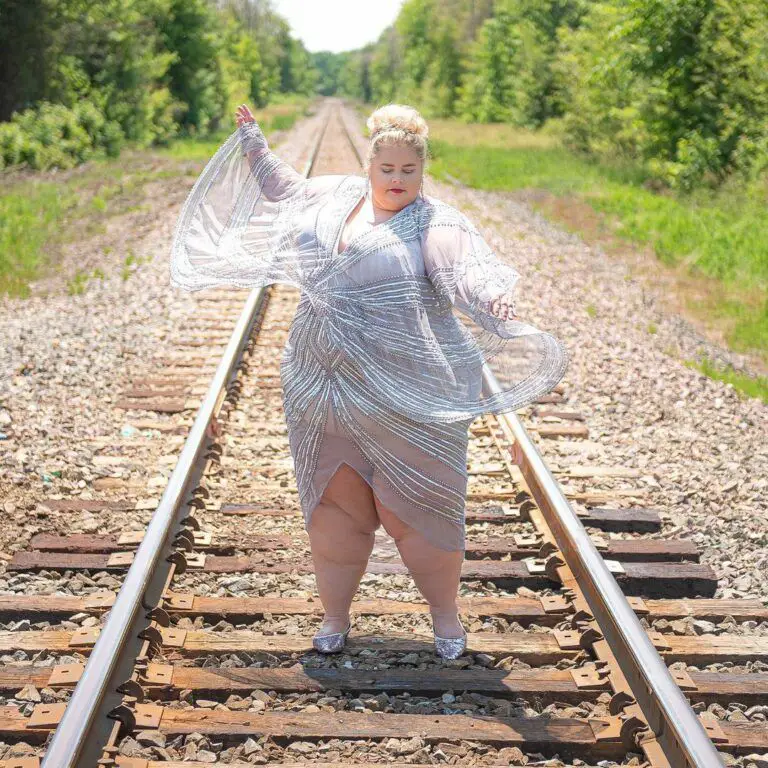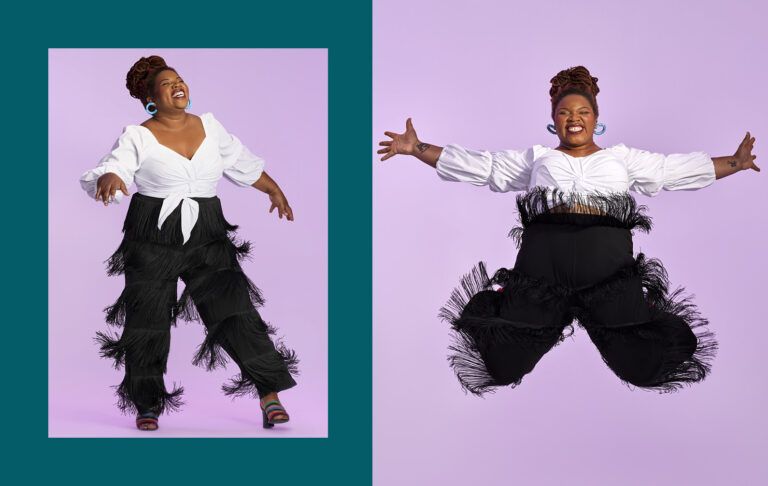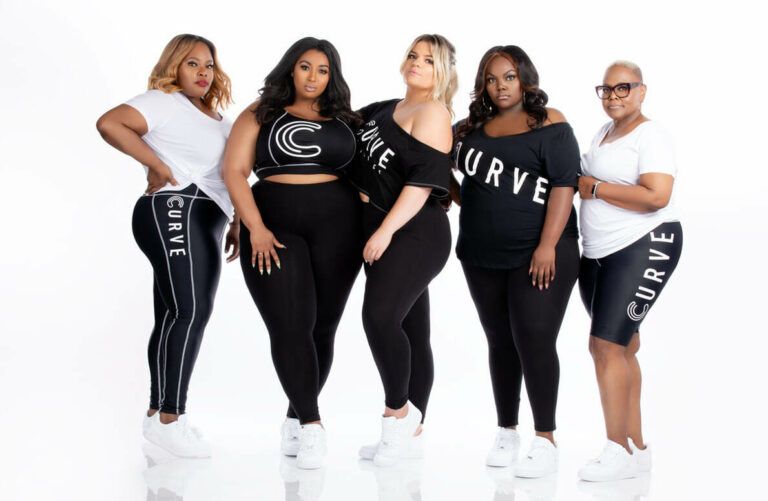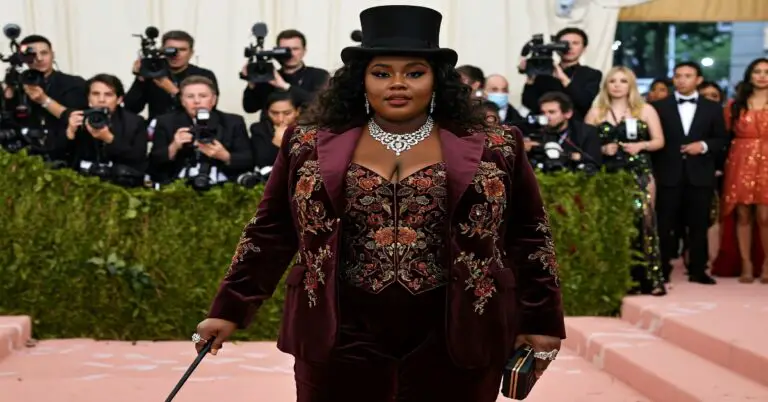For years, talent agent Tracy Christian spent her time copping contracts, preparing for premieres, and rushing through red carpets. She’d fallen in love with the gratification that leading some of the industry’s most high-profile celebrities’ careers brought her, bumping bags and sipping champagne with A-listers and the fellow elites accompanying them. However, while she enjoyed caring for her clients and basking in the bright lights that followed many of the stars she represented, Christian grew tired of scuffling to find glamorous gowns to seal deals or lug to award shows. Thus, she created her own runway wardrobe by launching a luxurious plus size clothing line, Sante Grace.
But… make no mistake; the New Jersey native’s road to ruling fat fashion wasn’t an overnight journey. Before this top-notch showbiz liaison found passion in the hustle and bustle of entertainment, she was a California transplant with a keen eye for fancy finery and stylish stitchings. The heart of Christian’s childhood was immersed in a deep love for closet-watching her mother’s diva-like attire and playing dress-up with toy figurines. Little did she know, those (seemingly) meaningless hobbies as an adolescent were only previews of the powerhouse professional she’d soon become.

After uprooting from San Francisco to Los Angeles for college, the early days of Christian’s adulthood saw her working around textile conversion and department stores. Although pretty threads may have lived at the pulse of her interest (which surely helped her time as the CEO of a modeling agency, too), Christian’s take-charge personality and entrepreneurial spirit catapulted her into the field of representation. At the urging of late filmmaker John Singleton, she took a leap of faith, and Tracy, the agent, was born.
From the outside looking in, she’s an East-Coast chick with a genuine love for people, but at the head of any corporate table, she’s a Black woman about her business… and her bag. The creative mastermind obtained a legendary list of clientele, which included the great Toni Braxton, Tisha Campbell, Busta Rhymes, and Kandi Burruss-Tucker, among other award-winning figures. She had it all, but still… not enough to put out the burning desire she had for beautiful clothes. So, in 2020, amid the global shutdown that COVID-19 ignited, Christian answered God’s call—one that she could no longer resist ignoring.
Straight from the dressing rooms to the sketch pads and sewing machines, Christian could’ve never imagined the gem that would become Sante Grace, specifically for those who looked like her. Those with the same styling dreams who could only wish would be a reality someday. A reality where fashion was limitless—far from the days of it being restrained by one’s weight or waistline. Suddenly, Christian cultivated a market ladies of bigger sizes didn’t think could be available to them in a major way.
Her brand grew into a representative for premier plus size garments, crafted with inclusion and embroidered with quality. Christian’s pursuit in providing high-end wear for curvier bodies didn’t stop at her VIP circle. She set out for all women—be it the nine-to-fivers or fellow bosses—to look the way they wanted to feel: grand.
It’s safe to say… Christian has succeeded that expectation.
We recently sat down for a one-on-one with this queen to learn more about her early beginnings and how they shaped the person she’d become today. Check it out below!
Celebrity Agent Tracy Christian on Conquering Hollywood & Crushing the Ceilings of Plus Size Fashion with Sante Grace
TCF: What I found really interesting about your story is the fact that the birth of your apparel line, Sante Grace, was actually a revisited childhood dream. However, before we get into Tracy Christian, the luxury plus size designer, I wanted to take it back to the very beginning. I know that you originally moved to Los Angeles for college, but I have to ask, where did your roots begin?
Tracy Christian: So, I’m from a weird combination of San Francisco and New Jersey. I think that comes up all the time. My parents met when my father was in the military. His home was New Jersey. When he finished active duty, they relocated to New Jersey, finished school, and kind of encountered the first batch of middle-class racism. After they finished school, and they were in their respective jobs and starting to climb the ladder in their jobs, my dad wanted to move to a different neighborhood. You know? One that was ethnically mixed and diverse. Every realtor would take him to a really nice Black neighborhood. He’d say, “This is great, I love it. However, I want my daughter to grow up around all kinds of people.” They’d say, “No, no, no, we got it! Absolutely,” and then they’d take him to [another] really nice Black neighborhood.
Tracy Christian: So, my dad just realized, like, there was kind of institutional racism in the way that people think here that I may not be able to battle. He went to the library because Google didn’t exist then, and he took out a book called The Most Beautiful City in the World, and it was all about San Francisco. So, he went to my mom, and he said, “Look, I’m going to drive out there and see if I can get us a place to live and a job. And, if everything works, I’m going to send for you guys in a year or so.” That’s exactly what he did. From [the time I was a] baby to [age] eight or nine, I was in Jersey… and then from nine to seventeen, I was in San Francisco, and then I moved to L.A.
TCF: So, how would you say that transition was? Like… going from up in Jersey to basically the other side of the country? [laughs]
Tracy Christian: I remember it all like it was yesterday. I remember the drive out. I remember my dad not being around for a year. I remember the first day that we drove in front of our new house in San Francisco, and it was complete culture shock. The food was different. The clothes were different. The attitudes were different–the religions, all of that. I grew up in this supportive, loving Black family. I don’t ever remember anybody saying anything racist or being racist or anything like that. My aunt, uncle, dad, mom, they knew white people and Asian people, but they didn’t hang out with those people. Those people weren’t neighbors. Other races, religions–whatever–really weren’t involved with our family.
TCF: I couldn’t help but smile when I read that your love for clothing ignited early on, having crafted your first skirt with your mother as a kid. Did you grow up in a fashion-focused household? Was your mother into fashion, or was it like a love that you developed on your own?
Tracy Christian: It was an interesting thing, and thank you for asking that. So, I grew up like a lot of East Coast families… it’s multi-generational, right? I didn’t live with my grandmother, but I would probably see my grandmother three or four times a week and see my aunts all the time. My mom was the youngest auntie, because she had me when she was seventeen. So, when my mom moved from Seattle, Washington to North New Jersey, honey, she was so close to New York. She was like, “I am not letting this get away from me!” Her nose was in every fashion magazine. Every weekend—if we didn’t have a family thing to do—she was trying to get into Studio 54 with her girlfriends or she was going to The Palladium! Just imagine you’re like twenty-four years old, [and] it’s the seventies. Halston is out, the wrap dress is out, you know, disco [is out]! So, you two cents cute.
TCF: How would you say your parental background reflects the woman you are now, as far as all of the values that you learned in your childhood?
Tracy Christian: Well, remember, I said my mom put that little shopping tour together? So, there’s a woman who wrote a book, Sally Socolich, [called Bargain Hunting in the Bay Area] talking about outlet places, and my mom had this great idea: rent a van, have a driver, sell tickets, and escort women around all these outlet places. And my dad—thank God, I had a really practical father—he just got freaked out about that. He was like, “You need insurance, and what about taxes?” He was very dot-the-Is, cross-the-Ts. He was so anal about it that my mom canceled the whole idea.
TCF: Seriously? [laughs]
Tracy Christian: Girl, we came from North New Jersey! When I was six years old, I knew the difference between a wino and a junkie. I knew this person drinks too much and is probably drunk. This person gets high using a needle, and they will steal from you and hurt you. Because it’s the inner city. The ghetto. I lived in the projects. Like, I was a Black American Princess—all of that—but yeah, I lived in the projects of North New Jersey, and there were certain things you had to know to survive. You’re a Black, little girl (and I was a latchkey kid), school is over, and you walk from A to B. [laughs] You walk from school with your girlfriends to home. You don’t stop at the store, and then you call when you get home or you get to your friend’s house. You don’t open that door for nobody! That building can burn down around you, but you don’t open that door. In fact, if somebody rings the doorbell, you don’t even need to look through the peephole because you ain’t opening the door. And if your parents call you, you better answer the phone! At six, seven, eight, nine—however old—my mom would call and say: “Okay, we have a chuck roast in the freezer. Take it out so it’s defrosted by the time I get home.” I’m watching cartoons or whatever, but I better not forget to take that roast or that ground beef! [laughs]
TCF: So, speaking of the woman you are today, those just now getting familiar with you through your brand may not know that you’ve been a top-notch talent agent in Hollywood for the past two decades or more. You came from a fashion background, and it was very evident that it was your destiny at an early age. Since those are two vastly different lanes, what prompted your interest in pursuing celebrity representation?
Tracy Christian: So, I actually didn’t know what I was going to be when I grew up. I moved [to Los Angeles] for college. I wasn’t like, “I love movies” or anything. My parents did take me to see a lot of left-of-center and independent films when I was very young. There used to be these things called video stores back in the day. Los Angeles, being a film community, we didn’t just have Blockbuster. Pretty much every neighborhood had a little, probably family-owned, video store, and you could rent videos for ninety-nine cents. Maybe ninety-nine cents a night. When I was in college, I didn’t have a lot of money. I don’t even think we had cable. But I got into video stores. So, I would just go through the video store like that. But, still, I didn’t know anything about representation. I just knew I liked movies. Who doesn’t like movies?
They were so cheap that you also got a chance to figure out what you liked, not what was just playing in the theater. When you went to the video store or the library, you discovered films that never got to theaters or never got on HBO or Showtime or anything like that. You could watch them over and over and over again. So, I’d write things down. Sometimes… I’d think, “Hmm, I’d really like this grouping of French films. Maybe I should write to that director and ask him why he did this, how he shot this, or contact the writer.” So, that’s how I became aware [of the fact that] these people had agents and managers. I was curious.
At the same time that was happening, I had a friend named Joseph Dougherty… who was a writer here in Los Angeles. We worked together at Robinsons, and he became John Singleton’s assistant. So, all of us knew one another. I graduated from school and was a receptionist at a textile converter company. It wasn’t fashionable, but it was like working for a mill that made fabrics. I didn’t know what I wanted to do with my life! One day, I was with John and Joe, and I said, “What do you guys think I would be good at? What should I do?” John Singleton said to me, “You should either be a madam or you should be an agent.”
TCF: So, you had no experience. What did you go to school for? What was your degree in?
Tracy Christian: Greco-Roman history.
TCF: Very impressive! It was basically just something you decided to shoot your shot at, right?
Tracy Christian: Yeah! Someone thought I might be good at it, I got the job, and it felt right. It felt like where I wanted to be, and I was curious about it. All the things I’d done, all the little, different jobs and hobbies I’d had in the past, supported what I was doing. I came to the industry thinking I couldn’t be a lit agent because I didn’t know how movies were made. I hadn’t read all the books in The Western Canon. I thought all lit agents were white men with East Coast educations, and they represent directors. I didn’t know anything about directing. But when I got into the job and allowed myself the freedom of not being so insecure, I realized I knew more than eighty percent of them! [laughs] Just because I’m a film enthusiast. And my father was a photographer. Plus, God gifted me with a good brain, so whatever I don’t know, I know how to find out! Some people, unfortunately, don’t have a good brain, [but] I have a good brain. That’s my secret power–one of my secret powers. I have a good brain, and I’m not lazy. I have an incredible work ethic.
TCF: There’s always this talk about the difficulties that we, as women, face in male-dominated spaces. As a plus-size, Black woman in such a take-charge line of work, would you say you’ve felt the effects of sexism and gender bias? If so, how did you break through that professional ceiling and become such a powerhouse player in the entertainment industry?
Tracy Christian: You absolutely have a bias against you. The way I used it is… people never saw me coming. I could tell when people thought, “Oh, she’s a smart Black girl. She’s well-educated. She’s well-spoken,” but the establishment never saw me as a threat. I was a threat! My Blackness, my fatness—all of that was camouflage. My personal battle was realizing there’s no hiding, there’s no reward just for working hard or smart. Oprah Winfrey introduced the concept to me that you’re not responsible for whatever anybody thinks about you. Don’t take that on. Whatever the world thinks about you, that’s their business. You’ve got to run your race. Eventually, I feel like I partnered with the Lord, my business, and everything that I do, and then… I was untouchable and fearless.
TCF: What’s a quality you see in yourself now that you wish young Tracy, who’d just entered the hustle and bustle of Hollywood, would’ve had back then?
Tracy Christian: I didn’t grow up in the church, so I wasn’t baptized until thirty-five or maybe forty or something. When I relied on the Lord, there was a kind of fearlessness and aggressiveness that I never had before. Literally! I feel like the Creator of the universe has my back. I’m asking for all the money. I want all the things. All of it! Give it to me and my clients.
TCF: Everything you deserve!
Tracy Christian: I want more than I deserve! All of it! It’s not about being nasty and mean, but really… I don’t have the vocabulary to even explain it. Clients that I represent, you get it all. Everything. Every life experience that I’ve had, every rumor, every fact, every fiction—you get it all. You get an agent who’s praying on your behalf… and, like I said, a fearlessness. I think we all have dreams. When I meet with a talent and they tell me what their dream or fantasy is, I know, many times, they’re actually minimizing their dream. They don’t want to sound foolish. They’re like, “Okay, well, I’m not going to tell her I want to own a studio and I want to blah, blah, blah.” Right? Because [they think] that’s d*mn near impossible. But what I want for them… is the impossible! If God is all of these things, and I’m created [by Him, why can’t we have it?] I want the impossible. I demand the impossible for myself every single day. And that’s the fun of what I do. Everybody in my business is getting people jobs. [The fun part is] that I can plot a career—that I’ve been given such a great brain and finely-honed taste that I could sit there and say, “This director will get off on my client. This role will catapult my client.” That’s all fifty years in the works. That comes from, you know, when I was five years old and my dad was taking me to see David Bowie in The Man Who Fell to Earth. I shouldn’t have been seeing that film at that age, but I was. Or… Last Tango in Paris or meeting the people who I’ve been blessed to meet in my life. I use all of those stories, all of that power, and I aim it and shoot it at my client’s career.
TCF: So inspiring! That said, what would you say has been the best piece of advice you’ve gotten from someone you’ve worked with in the industry?
Tracy Christian: That’s a good question! I don’t know that I’ve ever received some poignant advice, but I do have some advice that I would offer someone. This very much feels like how the old people sit down with the young people and try to tell them about life. You’re just sitting there, being polite, listening to your great aunt or whoever. You know these people love you, and the things they’re saying aren’t wasteful, but there’s something about youth where you’re not absorbing what these people are telling you. You’re thinking, “Well, that’s maybe the way that it used to be,” and then you get old and realize those old people were not fools! They knew what they were talking about. I should have listened to everything they said! [laughs] So, now, I’m in that part of my life where I know young people are not listening to me, but it is my duty to say these things anyway. My advice would be: Be fearless and rely on God.
TCF: Because He is your backbone through it all. I truly believe that.
Tracy Christian: Yes! Now, if you don’t have God, if you have something else or nothing, I don’t know what the advice is. I’m a fifty-year-old woman. I’ve seen people come and go. Trends, this, that, and whatever. Hopefully, my health holds up, and God’s willing, I have enough money… that I have another fifty years, right? Hopefully! And I’ll live that fifty years as an adult. The first fifty years? Some of it was as an infant, as an adolescent, as a teenager, and then finally as an adult. So, I feel like now, at fifty, I’ve just truly graduated from school. When I saw people who were fifty, [I thought that] was old-old! [laughs] When my grandmother would look in the paper and be like, “Oh, this person passed away,” I would be like, “Yeah, they were a thousand years old!”
TCF: Counting the days!
Tracy Christian: Girl, the stories I could tell you! [laughs]
Tracy Christian: When I speak to someone who’s nineteen or twenty years old, it falls on deaf ears, but we have such a small amount of time here. Be fearless. Not stupid—fearless—and aggressive in going after the life you want and the person you want to be. Even when you’re not working, time is moving on. It doesn’t stop. It doesn’t stop because you went to sleep or gave up. It is going. It is moving forward. So, if you want to be a mother, go after the relationships and situations that allow you to be who and what you want to be. You want to be a professional? Do that. There will be obstacles… because that’s what life is. Life comes after everyone, but be fearless in the pursuit of your joy and your life. That’ll be your biggest reward. What I can tell you is… success is an accumulation of small decisions.
TCF: That touched my soul right there. [laughs]
Tracy Christian: Well, I’m glad!
TCF: So, I’ve always been one to believe that every path we travel in life is preparation for the next. You’ve been very vocal about how you put off launching your clothing line for many years due to the e-commerce arena not being as cost-efficient as it is now.
Here it is 2025, and after taking that leap during the pandemic, Sante Grace is one of the largest plus-size retailers right now. With that said—aside from the financial side—do you have any regrets for not starting it sooner? Anything you would’ve done differently?
Tracy Christian: No. Where you are is where you’re supposed to be. If you’re working hard at something, believe where you are is where you’re supposed to be. You’ll look to the left, you’ll look to the right, [and] say, “My friend is more successful, ““This took off, that didn’t,” or “Why am I not making the same money?” One of the hardest things to accept is: if you are doing the work, you’re where you’re supposed to be. Again, the gym of life. My mom was always trying to lose weight—every kind of diet there was! My dad would walk around the block and lose fifteen pounds. You know men lose weight faster than we do. You’re where you’re supposed to be. I’m not going to say, “Don’t compare yourself,” because we all do it. You need a certain amount of comparison to know that like, “Okay, I’m doing enough” or… what have you. But you are where you’re suppsoed to be. I constantly tried to launch a clothing line, but I couldn’t because I didn’t have enough time. Or, like you said, e-commerce wasn’t as well developed or I didn’t have the money. Things prevented it, but every time I tried to launch the business, I learned something else or I gained more resources. So, when Sante Grace finally was able to launch and took off, I could walk in downtown L.A. and I already knew the stores I was getting my fabrics from. They already knew me!
TCF: Did you have any reservations in terms of the market since, at that time, entrepreneurship skyrocketed and people deemed it oversaturated. Or… were you just fearless?
Tracy Christian: No. Not one. I knew the problem I was solving. I’ve been plus size all my life. My mom was plus size most of her life. If you are a bigger person and Lane Bryant doesn’t float your boat, where do you do? Where do you go?
So, better clothes, for me, are about not worrying about how this fabric was dyed. Or, not worrying about buying this coat again next year because it fell apart because it was only twenty dollars. I want to buy better, so that I don’t have to buy it again. When I hire people, I hire the best that I can afford. Why? I don’t want the job done cheap, I want the job done right. So, I’m willing to pay whatever I can afford for it. Same with my clothes. Every bag is not going to be a Birkin, but I respect the workmanship that goes into that. I respect the fact that this bag is sturdy enough that I can put all my makeup in it or I can walk down the red carpet with it. I could get double, triple the use out of this than I could get out of this bag that I’m buying from Ross. So, I wanted those kind of fabrics for big bodies. Baby, we don’t have nothing on my website that’s satin, okay? That’s silk. But you wouldn’t know that if you’ve never in your life worn a silk dress or a silk blouse because it wasn’t available to you [or] because Ashley Stewart doesn’t carry silk. And they’re not supposed to at that price point. I want to give women that experience.
TCF: And I love that—especially for plus-size women. People underestimate that we want to look good in high-end clothing, too!
Tracy Christian: Absolutely. We’re not just satisfied with leggings and a matching sweater over it. And… we’re not trying to look skinny and we’re not trying to disappear! I know what size I am. I’m good! I’m cute at this size. If I lose weight, I’ll be cute at that size, too.
TCF: Period!
Tracy Christian: Period!
TCF: So, what are your thoughts on the current state of plus size fashion, and how do you hope your brand will reshape the narrative?
Tracy Christian: Right now, it’s two things. It’s a form of prejudice. So, one, I’ll say… to the legions, my sisters out there who are plus size, if you see something that you like, support it or it’ll go away. My dad would always tell me, “The strongest way for you to vote is with your dollars.” If you like something, buy it. I’m not saying go bankrupt. We’re not talking about being foolish! But when you don’t support brands, they go out of business. There are no magic people in the universe! [laughs] My line isn’t just bought by wealthy women; it’s bought by working women with kids and responsibilities. That two-hundred-and-twenty-five-dollar blouse? That’s an expense for them.
They put it on a credit card [or] use Afterpay and pay it off. But… they also send me emails and they’re like, “Girl, I shut it down!” We only made five of those, so you’re never going to run into your twin. It’s going to last forever. And it’s stylish–ultra, ultra stylish! In a way that doesn’t exist in the rest of the world. So, they’re like, “Okay, I bought the blouse. I can’t wait to get those silk pants. Does the such and such match with that?”
TCF: And it makes them feel good!
Tracy Christian: Yes! As African-American women, we know what journey we went through in this country. My grandmother was such a stickler about [instiling in me that] certain places that I would go to or things that I would have to do, I had to be dressed appropriately and [have my] hair done. She was not letting her little, Black girl walk out of the house looking crazy! I noticed that other communities, they would be like, “Oh, this is just whatever. It’s not a big deal.” No, no! I had to sit there and get my hair done! [laughs] I couldn’t show up to school just looking any ole way. I had to present [myself well]. Now, historically, I know why. Because there were myths, untruths, and racist things said about Black families and Black people. We were supposed to be unclean, unkept, lazy, uneducated–all of that stuff. So, one of the ways that our community refuted that was we went way to the other side and go above and beyond! Like, “I didn’t have to take that many baths, Mommy!” [laughs]
TCF: Yes!
Tracy Christian: More than sixty-five percent of the population is “plus size.” We’re the majority!
TCF: We’re ruling things! [laughs]
Tracy Christian: Yes! But, somehow, we allow the skinny-people publicists to make us think that we’re the ones that are wrong!
TCF: As if we’re taking up space!
Tracy Christian: Yes! We are the majority. That’s number one. Number two, the media is trying to tell you that you’ve got to take a shot every two weeks to get skinny or get gastric bypass. And, just to clarify, I’m not against any of those things! I want people to have healthy bodies, I want you to be happy with the image that’s in the mirror–health over everything. But I think when you are struggling with your self-esteem, you are transmitting that message to your ecosystem, to your children, to your partner. I know because I’ve gone through. it myself, and I’ve watched it with my friends. When you have clothes that allow you to express yourself–whether they are my clothes or Lane Bryant’s clothes–when you can look in the mirror and like what you see, you also transmit that to your ecosystem. So, if you’re trying to convince the little girl that you’re bringing that she’s beautiful–no matter what color her hair is or what acne she does or doesn’t have, her bra size, or her body size–the best way for you to teach her self-esteem is for you to have it. The best way for you to teach your young men that women are to be valued is for you to value yourself. How much do you value yourself when you work a forty-plus-hour week and will only feed yourself fast food? The lowest common denominator. Or, when you will only buy your clothes–or you buy the majority of your clothes–from fast fashion.
You’re really a size sixteen, but you got to buy it in a 4X because it’s made in China and, you know, the sizes are crazy. Or, your jeans cost ten dollars and you’re squealing about ten-dollar jeans. I’m like… I’m worth more than ten dollar jeans!
TCF: We deserve nice things, too!
Tracy Christian: We deserve nice things, period! Period! I didn’t work all of those hours so that I could buy five-dollar jeans. I want the ones that are going to last, the ones that are cute, the ones that look good on me. Not for a moment. I want to be able to take them in and let them out. I want to be able to dress them up and dress them down. I want the jeans to be made out of real cotton denim.
TCF: And comfortable!
Tracy Christian: Yes! I just want more. I want more. I deserve more. I want to try everything and decide what I like. But when I came up, everything wasn’t available. The only thing that was available was the Ashley Stewarts, the ASOSs–whatever. We deserve to try high fashion and see if we like it. We deserve to try a cashmere sweater and see if we want to stop wearing acrylic and switch to cashmere or cotton. It deserves to exist, so we can decide what we want. Before, we didn’t get to decide. We had to take whatever was available in our size. So, companies like Sante Grace exist so that you have freedom of choice.
TCF: In an era where fast fashion is the go-to for most, what would you say is the most challenging about running an high-end company?
Tracy Christian: I don’t think fast fashion is the choice for most people. I think the job is getting the word out that there are other options and allowing people to experience those options.
TCF: Ahhh, I see your point now.
Tracy Christian: I’ll just compare it to food, right? There are restaurants out there, they have Michelin stars. Every Michelin-star restaurant isn’t expensive. A lot of them are, not all of them are. But go out and experience them, even if it’s not what you were brought up with. I’m fat because I love food and hate exercise! [laughs]
TCF: [laughs] Same here!
Tracy Christian: Okay?! [laughs] I know how I got myself in trouble! But… when I say that I appreciate food, I am just as likely to go up the street to the taco stand that I love–where the tacos are two dollars and fifty cents–or get the Nachos BellGrande from Taco Bell as I am to go to the Michelin-star Mexican restaurant that I have to dress up to go to. I want to experience it all! I’m curious about it all! So, that’s who I encourage women to be when it comes to fashion. You have more options. We just have to get the word out that there are other options and why you should afford yourself with them.
TCF: Options that should be explored, instead of just settling for what feels–
Tracy Christian: Familiar!
TCF: That’s it!
Tracy Christian: Like, people feel like, “My mother always shopped at Macy’s, so I shop at Macy’s.” Shop at Macy’s, go to something that’s a little less expensive, and walk through a store that’s more expensive. You decide where you belong and what you want to do. I do it all!
TCF: Spring is upon us… and so are the new trends! As plus size women, we often struggle to find a style that works for us, so what tips would you offer someone who’s just now coming into their fashion sense and doesn’t really know where to begin?
Tracy Christian: I would say… look to make mistakes. [laughs] It’s only clothes! It’ll be alright. I do a little bit of everything. I’ll find characters on television that I really like how they dress. Like, when Scandal was on, I was like, “Why aren’t [Olivia Pope’s] suits available for everybody? But definitely plus size.” I love the little suits that Kerry Washington had. I liked the way that character dressed. Or… on Sex in the City, Carrie, her dressing is often so immature and ridiculous, but water it down, I like that irreverent kind of style. I like the idea of putting something that is truly designer with something that’s from the Salvation Army. Go out there and experiment. Just like food or film. We’re coming out with some style formulas. We’re going to allow people a little more confidence to mix and match. The first thing that you can do is find people in media, or characters in media, [who] you like the way they look, you like the way they dress, and then emulate that. You are going to make some mistakes. I think about some of the things that I have worn and I shake my head! What was I thinking? [laughs]
TCF: Even on the red carpet? Do you have any cringe moments you remember? [laughs]
Tracy Christian: On the red carpet, I’m usually pretty conservative because the red carpet is a moment that’s all about my client. I’ll have on a suit, a tuxedo, or a conservative dress. However…. just in like going to brunch with the girls, yes, I have made a mess! But I tried. [laughs] And clothing is fun. Think back to those Barbie days we talked about earlier. It should be fun [trying on things]. Experiment! The way my closet works is–it’s a little different now because I have a much bigger closet because I’m designing collections–I’ll see something that Jenna Lyons wore and I realize, “Oh, I have all the elements of that outfit.” So, I put that outfit on. Alright, I’m a carbon copy of Jenna Lyons right now. [laughs] Obviously, we’re different sizes! I wear that, but then I come home and I’m like, “Well, let’s see what this looks like with a belt or with some ethnic earrings.” I do like a little bit of a change-up. You find a different outfit. So, once I find. a different outfit in the house, now, I have it in my mind. Then, I can pull from that mental catalog when I need to. If you invest a little time in yourself, one hour a month–trying on your clothes, experimenting, seeing what looks good with something else–you’ll find that when you need to put these outfits together, it’s a lot easier. It’s not as much drama.
TCF: I’m sure it makes it less intimidating, too.
Tracy Christian: Exactly! Sometimes, I have to go to these fancy events, and I used to be like, “Oh… my god! What am I going to wear?” Now, I have so many looks to put together. Not just because my closet is big, but because I’ve experimented. Like, I know if I have this bubble dress, then I could put this with this belt.. [and so on] because I’ve already done the work. And when you do things like that, you realize, “Oh, okay, I need a strapless bra for this” or “I need this kind of undergarment.”
TCF: That’s the worst!
Tracy Christian: That is the worst! Because we don’t have the ability to just go to the mall, and everything we need is right there. A lot of the things that we need, we’re ordering. So, give yourself the time. It’s a lot less expensive when you think like, “Okay, for summer, I wear a lot of spaghetti strap stuff, a lot of strapless stuff… let me order all of those strapless bras or silicone bras or lace tank tops. Now, I just have them in my drawer, and I could pay for them over a few months. Rather than putting three hundred dollars’ worth of bras on my credit card at one time.”
TCF: When it’s all said and done, how do you want Sante Grace’s contributions to impact the plus size fashion industry?
Tracy Christian: Ooooh! [laughs] I see myself as an empire builder. First of all, I want to free the captives. Because of Sante Grace, I want women, plus size women, to finally have the looks that give them the confidence they need to take over the world. If your world is just as the PTA or it’s becoming president of that bank, do it in Sante Grace.
TCF: What’s next for you and Sante Grace? Any big things coming up?
Tracy Christian: We have new collections that I’m excited about. We’re also opening Sante Grace Publishing. We created a number of comic books starring plus size characters taking over the world. So, that’s fun and interesting for us! Eventually, I’d love to be publishing paperback books for women as well. That’s what’s on the horizon right now!
Keep up with Sante Grace online:

